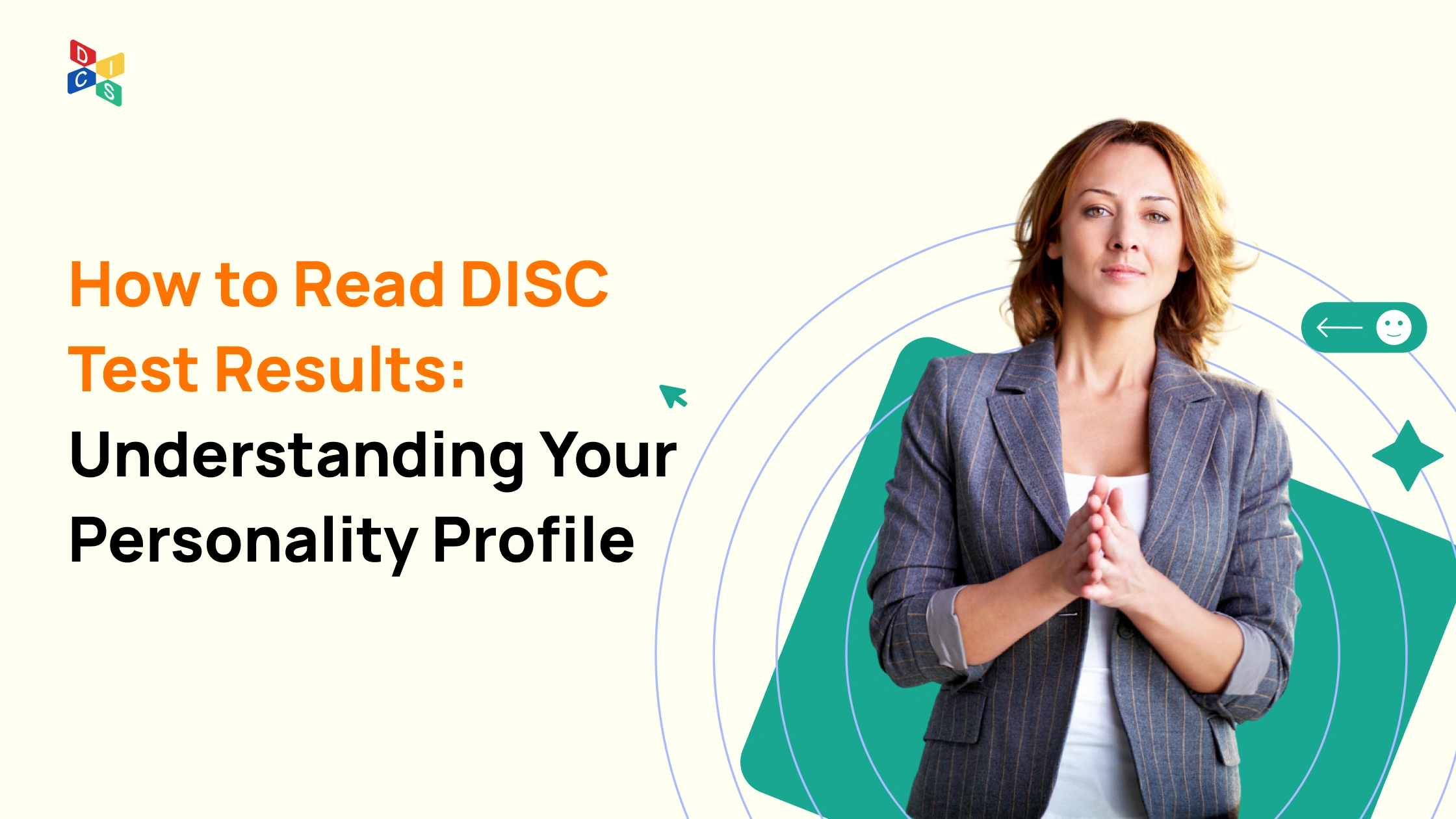Table of content
Di Personality Type in DISC: What Are Your Strengths and Weaknesses?
Discover the Di personality type in DISC, its key traits, workplace strengths, relationship styles, and how Di compares to other “D” types.
The Di personality type is known for its bold, energetic, and persuasive nature. Blending dominance (D) with influence (i), Di personalities are natural leaders who move fast, make decisions confidently, and aren’t afraid to take risks. In this blog, we’ll explore the key traits, strengths, challenges, and how the Di type compares to other D-style personalities.

Core Characteristics of the Di Personality Type
The Di personality type is a fascinating blend within the DISC model, characterized by a dynamic interplay of Dominance and Influence. This unique combination shapes how individuals with this style approach tasks, interact with others, and navigate the world around them. Let’s break down the defining traits that make this personality type stand out.
For a deeper dive into the "D" (Dominance) aspect, check out our article: DiSC Test D Personality: How Dominant Are You in 2025?
High Dominance and Influence
The Di personality type is assertive, confident, and persuasive - often leading conversations and driving decisions. They naturally seek control in situations and enjoy motivating others to follow their lead.

Strengths:
- Bold decision-makers
Effective at leading teams and projects - Able to influence and inspire others with confidence
Weaknesses:
- Can be perceived as overpowering or overly assertive
- May dominate conversations and overlook quieter voices
Read More: 16 DISC Personality Types - Why and How It Matters?
Goal-Oriented and Persuasive
People with a Di personality type are highly goal-driven. They focus on results and have a strong desire to win. Combined with their influential nature, they’re also great at persuading others to get on board with their vision.
Strengths:
- Unwavering focus on objectives
- Excellent motivators and vision-casters
- Strong negotiation and persuasion skills
Weaknesses:
- May prioritize goals over relationships
- Can be impatient with delays or indecision
Fast-Paced and Action-Oriented
The Di personality type thrives in high-energy environments. They prefer to take immediate action rather than dwell in analysis. Speed and momentum are key values for Di types, and they dislike being slowed down by bureaucracy or excessive detail.

Strengths:
- Quick to initiate and execute ideas
- Excellent in fast-moving or high-pressure roles
- Great at overcoming inertia in teams
Weaknesses:
- May skip important details
- Can become frustrated by slower-paced colleagues
Risk-Tolerant and Decisive
One of the defining traits of the Di personality type characteristics is their comfort with risk and their ability to make decisions quickly. They don’t shy away from uncertainty and are willing to take bold steps to achieve success.
Strengths:
- Willing to take initiative in uncertain situations
- Decisive even under pressure
- Often drive innovation through bold moves
Weaknesses:
- May act without fully evaluating potential consequences
- Risk-taking can lead to burnout or missteps if unchecked
Outgoing and Enthusiastic
A Di personality type isn’t just powerful - they’re also charismatic. Their outgoing energy and enthusiasm make them natural social leaders who easily connect with others and energize teams.
Strengths:
- Builds strong rapport quickly
- High energy inspires team morale
- Naturally engaging in presentations and conversations
Weaknesses:
- Can struggle with listening deeply or slowing down
- Might overlook others’ input in their enthusiasm to lead

Di Personality Type Strengths and Challenges in the Workplace
Di personality type’s combination of Dominance and influence creates a dynamic professional profile. Although these people typically bring a lot of energy and desire to their occupations, their individual tendencies may cause some problems in the workplace.
Strengths in the Workplace:
- Natural Leadership: Di types are naturally forceful and tend to take up leadership roles. Because of their aggressiveness and ability to motivate others, they excel at leading teams and moving projects forward. They can motivate others to follow by clearly expressing their goal.
- Effective Communication and Persuasion: Di personality type’s persuasive attitude allows them to articulate their thoughts with passion and conviction. They are useful in sales, negotiations, and teamwork because they can effectively persuade stakeholders, clients, and colleagues.
- Goal Achievement Focus: Di people are determined to achieve their goals and go above and beyond. They usually inspire those around them to strive for higher performance because they set ambitious goals and are tenacious in their pursuit of them.
- Adaptability and Innovation: They are typically responsive to new ideas and adaptable to change because of their enthusiasm to try new things and risk-taking attitude. If they identify an opportunity to improve outcomes, they are frequently open to new procedures or technologies.
- Building Positive Relationships: Their outgoing and enthusiastic demeanor allows them to easily connect with clients and coworkers. They can foster a vibrant and optimistic team environment, which improves cooperation and morale.

Challenges in the Workplace:
- Potential for Being Overbearing or Dominating: Coworkers who prefer a more cooperative or consensus-driven approach may perceive their strong drive and assertiveness as aggressive or insensitive. They must take care not to dominate other people's perspectives.
- Impatience with Slower Paces or Delays: Because they work rapidly, they may grow frustrated with coworkers or slow-moving procedures. As a result, they may occasionally appear impatient or even scornful of thoroughness.
- Risk of Overlooking Details and Thoroughness: Their attention to detail and hurry may force them to overlook critical facts or fail to assess all possible consequences. This can sometimes result in errors or the need for greater effort.
- Difficulty with Routine and Repetitive Tasks: The Di personality type thrives in dynamic environments with new challenges. They may struggle to focus on repeated or highly structured tasks if they do not find them engaging.
- Potential for Poor Listening Skills: They may occasionally dominate conversations and fail to fully listen to the ideas of others because they encourage action. This may make working together more challenging and lead to miscommunications.
The best jobs for DISC high D and I individuals
Leadership, persuasion, and results-oriented careers are typically suitable when asking about DISC Di personality type careers. Some potentially best jobs for DISC high D and I include:
- Sales and marketing: Their ability to persuade people and their commitment to achieve goals make them incredibly valuable.
- Entrepreneurship: Their initiative, vision, and ability for influence make them well-suited to starting and operating their own firms.
- Management and Leadership Roles: Their aggression and ability to encourage teams make them suitable for managerial positions.
- Real estate: Their drive and interpersonal skills are crucial in this field.
- Public relations: Their enthusiasm and ability to speak are useful for making and maintaining connections.
- Project Management: Their capacity to lead teams, as well as their action-oriented nature, make them useful.
To get a comprehensive understanding of your profile, consider taking Comprehensive Test Deck
The Di Personality in Relationships
The energetic nature of Di personality type relationships often leads to exciting, fast-moving dynamics. Di individuals are passionate, talkative, and assertive, whether in friendships, sexual connections, or family situations. However, their dominant tendencies may demand extra vigilance to maintain peace.

How Di Personality Types Connect with Others
- Bold and Expressive Communicators: Di personalities don't hesitate to express their objectives, feelings, or thoughts. They are direct, frequently endearing, and infuse their relationships with energy. Their confidence and energy attract others.
- Take-Charge Attitude: Di types typically take the initiative in relationships. They appreciate planning, solving problems quickly, and sustaining momentum. They prefer action over lengthy debates or overanalysis of situations.
- Loyalty and Passion: Di personalities are passionately protective and loyal when they are invested. They will work hard to ensure that their relationships thrive and grow.
Relationship Challenges for Di Personality Types
- Tendency to Dominate: Because of their high-D personality, Di types may unintentionally overpower others in talks or decision-making, resulting in conflict or an imbalance.
- Impatience with Emotions: They like quick remedies and may struggle to understand people who need more time to process their emotions or who require emotional depth that goes beyond reason and action.
- Need for Independence: Di types value their independence, despite their excitement. They may not get along with friends or lovers who are overly reliant or uncertain about themselves.
How to Identify a Di Personality Type

Taking a reliable Di personality type test in DISC is the most accurate way to establish whether you have this personality type. This simple test examines your dominant and secondary characteristics to see where you fit on the DISC spectrum and whether Di is your natural style. You may be a Di if you identify with the following characteristics: driven, persuasive, quick-witted, and action-oriented. However, only the test can clearly demonstrate this.
For a broader understanding of the various DISC profiles, explore Understanding the 16 DISC Personality Types: Why and How It Matters?.
Comparing Di Personality Type to Other “D” Types
The Di personality type has its own distinct mix due to its strong secondary "i" (influence) component, despite the fact that all "D" types in the DISC model share traits such as confidence, aggressiveness, and a results-oriented mindset. Let's see how Di compares to other "D" personality types.
To fully grasp the foundation of these styles, it's helpful to understand What Do The Letters in DiSC Stand For?

Di Personality Type and Pure D
High dominance is the primary, and often only, high attribute that identifies the Pure D personality type. Even though both the Di and Pure D types are focused, decisive, and results-oriented, their approaches differ significantly due to the Influence component.
| Feature | Di | Pure D |
| Focus | Achieving results by influencing people | Achieving results directly by prioritizing tasks over relationships |
| Communication Style | More outgoing, enthusiastic, and persuasive | More direct, concise, and often forceful |
| Relationship Orientation | More people-oriented, value building connections | More task-oriented, view relationships in terms of their contribution |
| Approach to Risk | Willing to take risks, with the support of others they have influenced | Also risk-tolerant but may make decisions more unilaterally |
Di Personality Type and DS
High Steadiness and Dominance are combined in the DS type. Although both kinds are motivated and capable of assertiveness, Steadiness stands in stark contrast to the Di personality type’s influence.
| Feature | Di | DS |
| Focus | Achieving results by influencing people | Achieving results directly by prioritizing tasks over relationships |
| Communication Style | More outgoing, enthusiastic, and persuasive | More direct and factual |
| Relationship Orientation | More people-oriented, value building connections | Values loyalty and dependability |
| Approach to Risk | Willing to take risks, with the support of others they have influenced | More resistant to sudden change, preferring a stable environment |
Di Personality Type and DC
The DC type combines high dominance with high conscientiousness. Although both kinds are motivated and goal-oriented, the DC type's Conscientiousness component emphasizes precision and completeness, which contrasts with the Di personality type's emphasis on influence and action.
| Feature | Di | DC |
| Focus | Achieving results by influencing people | Achieving results through careful planning, analysis |
| Communication Style | More outgoing, enthusiastic, and persuasive | More analytical, precise, and focused on facts and data |
| Relationship Orientation | More people-oriented, value building connections | More cautious and analytical in their approach to risk |
| Approach to Risk | Willing to take risks, with the support of others they have influenced | Prefers a more deliberate decision-making process based on data |
Want to apply these insights in your organization? Learn how the DISC model is used in HR and team management to improve collaboration and leadership dynamics.
Final Thoughts
The Di personality type is energized, motivated, and persuasive, with a strong sense of power and influence. These natural leaders inspire those around them, thrive in fast-paced environments, and pursue goals with tenacity and determination. Their charisma and self-assurance are undeniable strengths. Di, on the other hand, may be able to improve her personal and professional success by honing her ability to actively listen to and consider the perspectives of others.
FAQs
What does Di mean in DISC?
In the DISC model, "Di" represents a personality type characterized by a high blend of Dominance (D) and Influence (i). Di personality types are determined and goal-oriented (Dominance),as well as persuasive, enthusiastic, and people-oriented (Influence).
Are Di personality types rare?
The Di personality type is not exceptionally rare, but it is less common than certain other DISC types. It's most often seen in individuals who enjoy fast-paced environments, leadership roles, and dynamic interaction with others.
What careers are best for Di personality types?
Di personality type excels in positions that require persuasion, strategy, and leadership. Executives, business owners, sales managers, marketing directors, and public speakers are examples of excellent careers requiring initiative and results-oriented behavior.
Are Di types good leaders?
Yes, Di types are born leaders. They excel in leadership situations due of their confidence, charisma, and proactive attitude, especially in environments that reward inventiveness and quick action.
Can Di personality types work well in teams?
Definitely, but cautiously. Even though Di types prefer to take the initiative, they may work well in groups if they achieve a balance between assertiveness, active listening, and respect for opposing ideas.


Don't Let Your Potential Stay Hidden!
Take the DISC test today and discover your unique 'YOU', with deep insights into your true personality and potential.

Represents your instinctive behaviors and desires.
Shows the behavioral tendencies you think you should exhibit in specific situations.
Related articles
You may also be interested in
 DISCJan 06, 2026
DISCJan 06, 2026DISC Personality Test for Sales: Unlock Your Team’s Full Potential
DISC Personality Test for Sales helps sales teams improve role fit and performance. Learn how DISC boosts hiring, coaching, and customer alignment.
 DISCJan 06, 2026
DISCJan 06, 2026How to Read DISC Test Results: Understanding Your Personality Profile
Learn how to read DISC test results and understand your personality profile. Discover how DISC can enhance communication, teamwork, and career growth.
 DISCDec 31, 2025
DISCDec 31, 2025What Is Group Culture? How Team Behaviors Shape Workplace Success
Discover what is group culture and how it shapes team dynamics, decision-making, and performance. Learn how the DISC model can help improve your team’s culture.
